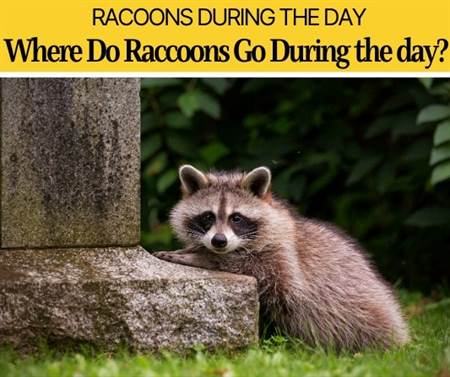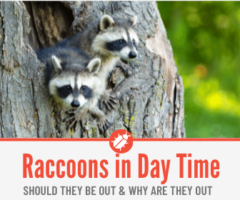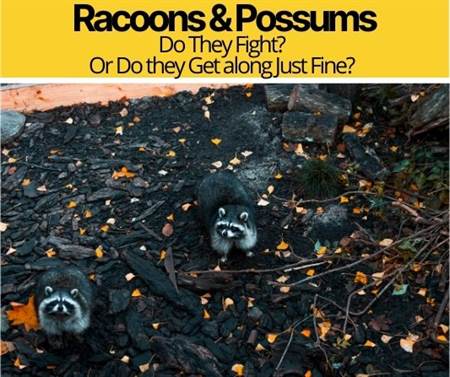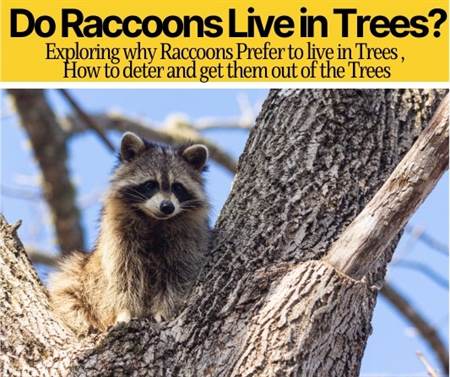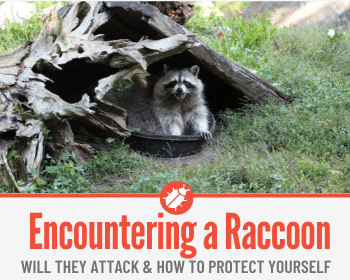 Have you ever ventured out at night and found yourself in an intensive staring contest with a raccoon? Wondering what to do if you see a Raccoon?
Have you ever ventured out at night and found yourself in an intensive staring contest with a raccoon? Wondering what to do if you see a Raccoon?
In this guide you will learn:
- What to do if you encounter a Raccoon & If Raccoons are Friendly towards Humans,
- Why a Raccoon might approach you & What to do If Approached by a Raccoon,
- What to do If a Raccoon Attacks you,
- What to do If A Raccoon has got into your Yard or House.
What to Do if you Encounter a Raccoon.
Raccoons can be very cunning, as they are very intelligent animals, potentially putting you in a lot of danger.
The best option is to calmly and decisively back away if you encounter a Raccoon.
Raccoon Attacks are very rare but can easily happen. Rabid raccoons are the biggest threat as many of them will be extremely aggressive and much more likely to be carriers of numerous other diseases.
You can generally scare raccoons away, but the best option is to leave them be and get them to leave of their own accord.
Cornering or trapping Raccoons will cause them to become defensive and likely more aggressive.
You don’t want to start a fight with these guys!
Encountering a raccoon in the city
Most urban raccoons have acclimatised to people and will ignore you. Some may hiss and then retreat but they are much less likely to be rabid and are therefore probably less aggressive.
It is still best however, to back away from any encounter.
If Seeking a Raccoon at Night
Raccoons are nocturnal and traditionally come out during the night-time hours to scrounge for food.
It’s very normal to see them during the night, many states consider them pests for their nightly antics.
It can be normal to see them during the daytime too as a mother may be looking for food for her litter or a new nesting spot.
Always proceed with caution around them and try to keep your distance. If the goal is to keep them away at night, light the yard as they will be able to deduce that it is not a quiet spot.
What to do if a Raccoon Approaches You
Break immediate eye contact and back away slowly if a raccoon approaches you.
Try to appear as large as you can in this situation, standing as tall as you can, waving arms and shouting.
You should also find somewhere safe, such as a building to take refuge in whilst you wait for the raccoon to pass.
If there are no buildings and the Raccoon continues to approach, you can take more extreme action such as throwing stones or spraying them with water.
It may also be advised to carry pepper spray as an addition to your bag, if you think an attack could be likely, as raccoons do not like the smell of cayenne pepper.
Cover any exposed skin with jackets or extra material you have, especially covering the face.
This kind of attack is relatively rare so these precautions are how any Marvel fans of Rocket the Raccoon might describe as: ‘for when things get really hardcore!’
Why Would a Raccoon Approach you?
Raccoons would most likely approach you for food, whether you have it, or in anticipation of getting some. It may also approach you if it is sick or in trouble.
You can identify a sick raccoon if it appears too tame, disorientated or too aggressive. In this situation call a professional for help, don’t be tempted to help it yourself.
If Raccoons are begging for food…
Don’t fall for their soppy eyes, as feeding them only causes more long-term issues.
Raccoons are intelligent and have lost their fear of humans’ overtime in urban areas – this means if you feed them, they will become less afraid and approach more frequently, associating humans with food.
This will also increase the risk of attack as they may get aggressive if they don’t receive any food.
What to do if a Raccoon Attacks you
In the event of a raccoon attack, cover all your exposed limbs with jackets and spare material, especially, the face and head.
Don’t try and corner the raccoon, this will only make it more stressed and subsequently more aggressive and likely to fight.
If you have no cover, your best bet is to run away. Fighting one would be too dangerous – run away and call for help. Experts may want to check the area for diseased raccoons.
Raccoon attacks can have nasty repercussions against humans. Scratches have resulted with people in stitches.
They can also transmit a number of diseases such as rabies and leptospirosis. Raccoons won’t purposely attack unless in self-defence or defence of their litter.
If you have been attacked by a raccoon you should seek medical attention immediately. You could have picked up any number of diseases, including rabies.
Raccoons are vectors for rabies, meaning that their bodies are the perfect breeding ground for the disease and any scratch or bite that penetrates the skin could be fatal.
Raccoons are smarter than dogs and have been compared to apes in their intelligence, so they should be kept away from of all of your pets. Any pets that come into contact with a raccoon should also be checked over for rabies.
What Does it Mean When a Raccoon Stands up
Raccoons sometimes stand up out of curiosity because standing enables them to get a clearer look at things. They have also been known to do it as an intimidation tactic, to appear larger. It is normally also accompanied by hissing and growling.
A raccoon’s hind legs are stronger than their front legs. This means they can use their hind legs to stand and utilise their front paws for catching and eating prey, as well as holding other objects.
Raccoons often appear hunched over when they walk or run, incredibly they can run up to 15mph.
Raccoon Behaviour Toward Humans
Raccoons can be rather aggressive and will attack if provoked or if they feel threatened. Commonly, they tend to hiss, spit or growl.
They have learned to co-exist with us and have been observed turning on taps for water, wash their food and rummage through the trash.
Are raccoons Scared of Humans?
Raccoons are very intelligent and any animal with an air of intellect will have a natural flare of curiosity. They may want to learn and adapt to you, after all, we are all competing for the same space.
Ultimately, they will be cautious and avoid you, but they are aware of their capabilities to defend themselves and can be known to ‘test the waters.’
They have also evolved to be less afraid of humans over time. Notably since the 70’s, when they did not approach or come into close proximity with humans at all but have since learnt to co-exist.
Are Raccoons Friendly and Nice?
They aren’t particularly ‘friendly,’ they may be curious and approach in search of food, but their cuteness is more of a ploy and not to be meddled with.
They are super dangerous in certain situations; many locals have compared them to zombies in the way they stand and stare at you in the darkness of the night.
The Zombie analogy alone should be creepy enough to keep your distance!
Some Raccoons can be mean are very bold, so they will come within close proximity and can be aggressive and intimidating.
However, it’s the rabid ones that are ‘mean’ and will viciously attack.
Possibility of Getting sick From Touching a Raccoon
Raccoons can carry infectious diseases such as rabies and other harmful bacteria.
It may be that you are quite unlikely to get ill from physical touch, however, contact could result in an attack which subsequently puts you at a much greater risk of getting ill due to infection.
It is best to keep your distance than run the risk of picking up any bacteria from their fur.
They may appear harmless, but dumpster diving enables them to acquire all sorts of nasty things which stick to their fur and could be a potential threat to you.
Raccoon excrement is equally as dangerous as you can inhale or swallow roundworm eggs, causing irreversible brain and heart damage, although rare.
What to do if a Raccoon has Got into Your House
If you have kids or pets, you should lock them in a different room immediately. Open all windows, doors, and other possible exits and let the raccoon find its own way out.
If it is in a room with windows or doors that are already open, lock it in the room and don’t go back in until you are sure it has gone.
Do not try to confront, corner, or trap the raccoon as you will make the situation more dangerous.
Arm yourself with a long object like a pole and potentially put protective gear on as a precaution. Call a local pest control or wildlife centre and they may be able to assist, and ultimately let it leave of its own accord.
What to do if you see a Raccoon in Your Yard
If there is a raccoon that comes back persistently, you should call a pest control company that will remove it.
In the moment, you can try light and sound to deter them from further entering the property.
This could either be a motion sensor light or solar powered ones. Sound could be from an outdoor portable radio.
They are looking for somewhere quiet and warm to nest, so light and sound is a great way to prevent raccoons and keep them away.
To keep Raccoons from entering your yard in the first instance, try securing the border with fences and close up any gaps or openings.
Keep garbage cans sealed, remove any leftover food or barbeques. Cover any access points and water sources.
You can also use ammonia or vinegar as they are not fond of the smell, as well as predator urine.
Although, you too, may not like the smell.
If seeing a Sick Raccoon in your Yard…
Don’t be swayed by guilt in this situation, call a professional or pest control immediately.
There is a fairly good chance the raccoon could be aggressive and carrying rabies, canine distemper, or feline parvovirus.
If you are bitten you need to contact public health and seek medical attention within 24 hrs.
Is it Legal to Kill Raccoons?
Most US states regulate raccoons as fur-bearing animals protected under hunting laws, permitting hunting, trapping, or killing them.
You can lawfully trap ‘bothersome wildlife’ on your property. Racoons especially will react very badly to being trapped so either let them be or call for help!
How do Raccoons Protect Themselves?
To Protect themselves Raccoons hiss, growl, bare their teeth and stand on their hind legs. They also have very sharp teeth and claws which are perfect for climbing trees and tearing into prey.
Raccoon bites have caused fractures to the bones of small animals and the need for stitches in humans.
Consider Using Raccoon Pepper Spray…
Cayenne pepper is a natural deterrent for raccoons. They despise the smell so pepper sprays can be a great addition to your going-out bag, in anticipation of a raccoon encounter.
You can also make up one of these sprays at home so they can be an affordable deterrent as opposed to the cost of keeping lights on all night.
Other good deterrents are water sprays for a close encounter. If you are trying to drive them away, then deploy ammonia-soaked balls or rags and vinegar. All of these are strong repelling smells.
It is always best to stay away from raccoons and run away in the possible event of an attack, so put your pandemic skills to good use and keep your social distancing in practice from raccoons (especially if you’ve got food!)

